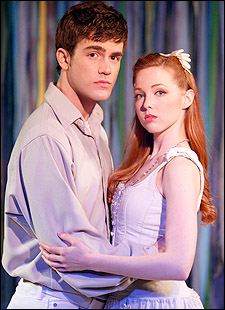
*
It was after midnight on May 3, 1960, the opening night of The Fantasticks, and producer Lore Noto had a tough decision to make.
His peculiar little musical about a Boy and Girl, two fathers and a Wall had gotten mixed reviews. Not the raves he'd hoped for, but not the outright pans that legend would later claim. The best ones were pleasant, but not what you'd call "money" reviews that made people line up to buy tickets.
Example: New York Times critic Brooks Atkinson wrote, in part, "Throughout the first act, The Fantasticks is sweet and fresh in a civilized manner." He was less enchanted with Act Two.
The show had no stars and no advertising budget. So now it was Noto's call: Close it? Or gamble on a run?
Earlier that night, at the cast party in the East 82nd Street apartment of designer Ed Wittstein, the cast and investors dined on Tex-Mex food in honor of the fact that the creative team — Tom Jones, Harvey Schmidt and Word Baker — all hailed from the Lone Star State. When the reviews came in at 11 PM, Baker had read them aloud in a sepulchral voice, which cast a pall. Kenneth Nelson, who originated the part of The Boy, had burst into tears and had walked home drunk, shouting at random people on the street for being "philistines." After the party broke up Schmidt, Jones and Baker taxied to the office of advertising manager Blaine Thompson's office above Sardi's restaurant for the traditional opening-night strategy meeting. Also among those present that night were associate producers Dorothy Olim and S. Miles Baron, ad managers Fred Golden and Ingram Ash, publicists David Powers and Harvey Sabinson, attorney Don Farber and his wife Ann, and, most important of all, Noto.
Thompson had a magnum of champagne waiting for them. But this was a bad omen: it was the traditional blow-softener for shows that were about to go belly-up.
Noto had everything he owned on the line. His last show had been a one-performance failure, appropriately titled The Failures. It was his only other producing credit. The Fantasticks was capitalized in its entirety at $13,000, less than some modern shows spend on shoes alone. The initial partnership was designed to sell shares for $330, but when takers proved few, Noto had been reduced to offering one-sixth shares for $55 apiece.
All the pro's looked at the reviews to see if there were enough great quotes for a newspaper ad. There weren't. So now, it was time for Noto to decide. Close the show and cut his losses? Or struggle on, hoping the show would miraculously find its audience?
Noto asked his partners for their professional opinions. Ash said, why throw good money after bad? Close the show. Golden agreed: close the show that night. The actors, including the then-unknown Jerry Orbach and Rita Gardner, wouldn't have to be paid through the end of the week, and what was left of the production could be liquidated so the investors could get a few cents back on the dollar.
Hearing this, composer Harvey Schmidt was crushed. He and lyricist/librettist Tom Jones had wrangled the project since their college days in Texas when its first draft was a Western called Joy Comes To Dead Horse. Now, years later in Manhattan, Schmidt only wanted the show to run through the weekend so that friends coming up from Texas would get a chance to see it.
Others in the office began to cry, including Olim, who remembers what happened next like this: "I can still see Lore getting up and everyone getting very quiet. He said to us, 'Don't be upset. We're not going to close. I believe in this show, and I'm going to put my money where my mouth is. This show is going to run and be very successful.'"
Noto announced that he would put up his life savings of $3,300 to keep the show going. And so, the next night, The Fantasticks gave its second performance. And the night after that, another. Schmidt's Texas friends got to see it, and he was happy.
 |
||
| Current Fantasticks stars Erik Altemus and Kimberly Whalen |
||
| photo by Carol Rosegg |
The final curtain came down at last on Jan. 6, 2002, after 17,162 performances — not because the show had stopped turning a profit, but because the new landlord wanted to convert the space. There was some talk of moving the show to another theatre, but Noto, who was dying of cancer, felt that The Fantasticks was site-specific to Sullivan Street, and that its time had come. Noto died six months later.
In 2006, a group of investors decided that New York City was not quite itself without The Fantasticks and they acquired the rights to do a revival. Mindful of the special place the Sullivan Street Playhouse had in the show's history, they refurbished the third floor of a former beauty school at Broadway and 50th so that it closely resembled the layout of the downtown theatre.
The Fantasticks is still playing there today, more than 1,400 performances into its new run. For the 50th anniversary, one of the few remaining living original cast members has rejoined the show in his original role: Thomas Bruce who is again playing the Old Actor ("Remember me…in light!"). Thomas Bruce is the stage name of librettist Tom Jones.
When El Gallo sings "Try to Remember," Jones will likely be remembering that dark night in May a half century ago when they all came this close to giving up on the seemingly indestructible little love story.
Robert Viagas is production editor of Playbill, founding editor of Playbill.com and author or editor of 12 books on theatre including the "Playbill Broadway Yearbook" series and "The Amazing Story of The Fantasticks" with Donald C. Farber.










